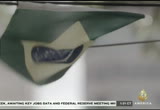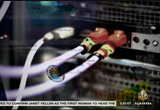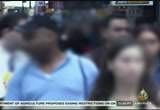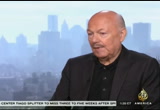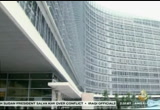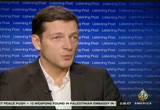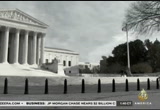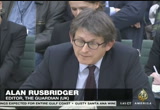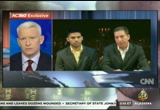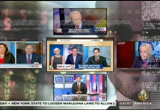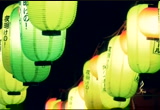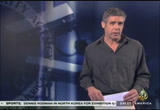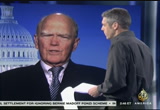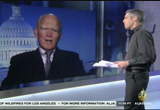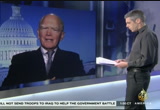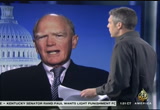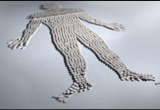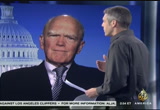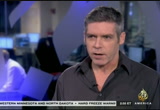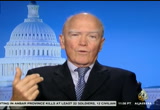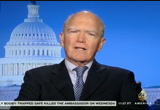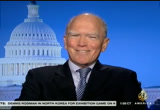tv Listening Post Al Jazeera January 6, 2014 2:30am-3:01am EST
2:30 am
>> that is hard core. that will do it for this edition of al jazeera. thanks for watching. >> hello, i'm richard g gizberg. now you know, how a special blue the whistle on the nsa. into the data banks of silicon valley giants, and the private communication he of millions of citizens around the world.
2:31 am
by getting the story that glen green wald got, snowden through carefully selected media outlets in germany france and brazil among many others. snowden has yet to come in from the cold. he's lying low in wintery moscow but according to the journalists involved, this story is far from resolved. there are more coming. our starting point, the adopted home of american journalist glen greenwald, rio de janeiro, brazil.
2:32 am
>> i had been contacted in december 2012, by someone who didn't identify himself but had interested material he thought h iwould want to look at. so i said send me something. he sent me encrypted documents. i immediately knew this was one of the most important security leaks in history. i had been working on surveillance issues and suddenly in my lap had dropped some of the most potent instruments for shining a light on what they were doing, beyond your wildest dreams as a journalist. unprecedented nature of the documents was going to be a earthquake in the political and media landscape around the world. and in the next i need my editor
2:33 am
to get the guardian behind it in a very fast way. >> june 5th, 2013, the day edward snowden blue the whistle on the nsa. first the guardian reported on a secret fbi order backed up by a court requiring verizon and other american mobile providers to hand over metadata, logs of domestic phone calls in the u.s. and to numbers overseas. the next day june 6th the washington post told the world about prism, a data mining tool so sweeping that the agency's own domentsd and diagrams called it the nsa's number one source of raw intelligence. and the nsa wasn't the only organization with some explaining to do. other intelligence agencies, mi-5 and gchq in britain and the
2:34 am
googles and yahoos and verizons, who opened their books, had their feet put to the fire. all those stories and more to come came from just one source, one leak. >> what we have learned from this massive outpouring of documents is just how secret surveillance operations have been. the extent to which the government has kind of taken free rein in what they believe they can do in the language that has been put in place. >> so to me, snowden has kind of lifted the tent flap to look inside a system. but i'm not sure the size of his revelations, matches the size of what we understand the revelations is or what we should do about it. >> the first wave of reporting in the u.s. media did some of that. but there was also the inevitable focus on the personal side of the stories.
2:35 am
who was edward snowden? school. >> high school dropout. >> a 29-year-old kid just throwing open the safe. >> oftentimes when the media are attacked by politicians or their officials, journalists say, don't shoot the messengers. >> this was a gift to them by edward snowden and the guardian. and you could see before the snowden leaks, how much did they spend looking into what nsa was doing? they did almost nothing. so it's an age old mainstream media anger that somebody else is getting a story they should have gotten earlier. >> why shouldn't you mr. greenwald be charged with a crime? >> he adopted the language of a politician that was unhelpful. >> i think it's extraordinary
2:36 am
that anybody who would call themselves a journalist, would milkily muse whether someone else. >> he was given materials he reported the materials he investigated the materials he put them out there. he is not aiding and abetting any kind of violation of the espionage act. >> what do you think of edward snowden? >> i think he's a traitor. >> i was annoyed that so much attention was on snowden, not on the information he was leaking. the truth of the matter was he sustained attention enough for there to be a story beyond edward snowden and the story is beyond edward snowden and that does show some wisdom behind the strategy that those who have access to the documents are employing. >> that strategy has seen glen greenwald turn to selected news outlets outside the united states with the snowden material and have those outlets publish accounts of what the nsa has been up to in their country.
2:37 am
in the stretch of three days ple monde in paris, including france's political and corporate elite. then der speigel revealed that chancellor merkel's phone could have been tapped including enrique pena nieto, and others spied on by washington. when journalists get exclusives most keep the material to themselves and publish their scoobs in one outlet. greenwald and his partner laura did the opposite. to maximize the impact. >> when we first started bidding into that material we saw that, well, if you see the european union, we saw wow that was really a big thing. then united nations, then we had the spying on the mexican government and we were this as
2:38 am
well and the definite highlight of this whole thing is that the nsa spied on the engineer than chancellor angela merkel which is in a way insane because germ my ha -- germany has been a tremendous good friend to the united states. >> what this has effectively done for the public is keep the issues of privacy, keep issues of surveillance right in front of them. so now they're more aware of how commercial sphwts are using the information, where it's flowing across the internet. it has been a massive increase across the board in awareness of privacy and information flows. >> when we approach the white house in the very beginning and we receive e-mails like, white house has no time this week to discuss this matter, we were like wow, and the white house has no time to discuss the surveillance of the european union, are you serious? >> the obama white house was already under attack over the
2:39 am
issue of whistle blowers the growing american security state and the keeping of secrets. the administration has prosecuted more whistle blowers under the espionage act than any other previous presidential administrations combined. gone too far whit tapped the phones of the associated press over one leak story and called a fox news reporter a criminal co-conspirator on another leak case on the iran nuclear issue. the white house's obsession of secrecy, had american journalists and press freedom activists worried about a chilling effect on sources. what edward snowden did blowing the whistle in a big way and revealing his identity if his not precise location happened despite that chill. >> there's a very big need for joinlts to have access to whistle blowers. the only alternative is to allow the government agency to keep want.
2:40 am
what happens when you have that is you have at a the warrantless eavesdropping where the nsa the getting secret access to information without any kind of legal authority. so you really need the intervention of journalists who make independent decisions on some of this information. >> there has also been a lot of discussion about whether the journalists should give up all of the technology that we have and go back to meeting people in the park over a cigarette, or in a parking garage, to exchange information, and that they should not be using cell phones or any of this, because that all is collectible and perhaps being collected. >> yet here in washington and here i -- i'm hearing increasiny that snowden has collected in fact that significant change on the part of those in government that they themselves don't have a full understanding of what the intelligence community is up to.
2:41 am
it is not whether obama knew or didn't know, it's not whether or not alexander as head of the nsa knew or didn't know, but that people really admit now that the system has become so large that nobody really understands it completely. >> have you been contacted by the fbi? >> for all the huffing and puffing on the u.s. airways about the prosecution of journalists, glen greenwald and those of the new york times and washington post who have reported on the snowden files are protected. the first amendment to the u.s. constitution guarantees freedom of the press. there is no such protection in britain, the home base of the guardian. the paper's alan russberger was journalism. >> do you love this country? yes. >> andrew parker the head of mi-five, the country's domestic spy agency, says, it is the gift they need to evade us and strike at will.
2:42 am
when the committee tried to get parker to testify to back that up with evidence, he simply refused to appear. right wing papers which styled themselves as protectors of have it rights in the u.k. and opponents of government overreach were less critical about what the cameron government is doing than what they were about the guardian reporting it and glen greenwald's partner was taken into custody at heathrow airport and held, for 11 hours, because he was carrying usb files containing encrypted files of the snowden material. >> it doesn't stop the spying, all it does is give them a huge black eye in the world. make them look thuggish around authoritarian. >> a new york judge sided with the agency. another in d.c. said it almost certainly breached americans' right to privacy. those cases are destined for the
2:43 am
supreme court. and the refugee appeared on britain's channel 4 to deliver a christmas message from moscow. >> the conversation occurring today will determine the kind of trust we can place in both the technology that surrounds us and the government that regulates it. together we can find a better balance, end mass surveillance. and remind the government that if it really wants to know how we feel, asking is always cheaper than spying. >> and as 2014 began, the guardian and the new york times published editorials calling on the white house to give the whistle blower clemency and the way home. after all the allegations and recrimination conducted in the court of public opinion edward snowden starts his seventh month in compile with a measure of vindication. the stream is uniquely interactive television.
2:44 am
we depend on you, >> you are one of the voices of this show. >> so join the conversation and make it your own. >> the stream. on al jazeera america and join the conversation online @ajamstream. >> and now, a techknow minute... >> something is killing america's bee population. >> what happened to this bee? >> scientists aren't sure what but beekeepers are reporting dramatic declines of 65% this year. >> the losses are astronomical >> that could have a devistating impact on agriculture. but a collection of resarchers are working hard to build a better bee. >> i'm just gonna roll my fingers forward... >> using artificial insemination to make strains of bee populations from across the globe, >> i'm trying to enhance what mother nature does >> the hope is to find a strain that's resistant to whatever is killing america's bees. >> nobody in the world was able to freeze honey bee semen.
2:45 am
>> for mor imformation on this and other techknow stories, visit our website at aljazeera.com/techknow don't miss techknow sundays 7:30et / 4:30pt on al jazeera america new lights use low wattage led rights, neither harmful for the trees nor dangerous for the kids that may touch them. >> many play-off spots in the n.f.l. are still to be decided. mark morgan is here to explain it all. >> hey, a lot of
2:46 am
anxiety in dallas, wondering what the dallas cowboys would do. tony romeo underwent back surgery. kyle ortman will start quarterback in the eagles game. sher een williams of the fort worth star telegram weighs in. >> that lees this game in the hands of kyle orten, he made 69 starts. he's 35 and 34. but has not thrown a pass as a starter and only thrown 15 passes over the last two years. it takes the pressure off the cowboys. no doubt about that. they can go in, play loose and >> an exclusive "america tonight" investigative series >> we traveled here to japan to find out what's really happening at fukushima daiich >> three years after the nucular disaster, the hidden truth about the ongoing cleanup efforts and how the fallout could effect the safety of americans >> are dangerous amounts of
2:47 am
radioactive water, leaking into the pacific eververyday? >> join america tonight's michael okwu for an exclusive four part series, as we return to fukushima only on al jazeera america >> when president obama went on the record saying he welcomed the debate on surveillance and security he was speak for the white house, not for american intelligence agencies. stewart baker knows those agencies from the inside out. he spent two years as the general counsel to the nsa advising spy master is there. , stewart baker is almost an unapologetic, he sees edward snowden as the bad guy in this agency. i spoke to him in washington, d.c. stewart baker, thank you for
2:48 am
joining us on listening post. >> glad to. >> let's start with the media side of this story. should as some people have suggested, glen greenwald and the guardian be proses cuted for bringing the edward snowden to to -- story to light? >> i don't think that's a reasonable prospect. i can't speak to what british law might permit, but in the u.s. the accommodation we have reached with the press is that snowden can be prosecuting pros- prosecuted but ro prosecuting the press is not something we would do. >> what about against the guardians the paper that initially published his findings? >> i haven't seen a lot of that to tell you the truth. people are unhappy and greenwald is currently an idealogue.
2:49 am
he is a journalist, and he is publishing it in reputable journals, acting in his own light responsibly and withholding certain kinds of information. so he's not the equivalent of an enemy agent. >> one of the reasons that edward snowden is said to have gone to the guardian as opposed to the new york times is because back in 2005, the new york times held back a story that it had on warrantless wiretapping, it held that story back at the request of the bush administration until after the 2006 elections. you were at the department of period. do you think that might be why snowden was resistant to approach the new york times or the washington post for that matter? >> 2006 i was. i can guarantee you the new york times would not hold a story because it would help president bush get elected. if that's your implication you're just wrong.
2:50 am
>> it is not my implication, it the implication drawn by edward snowden, the source of this story. >> he might have believed that. >> you clearly don't. you remain a supporter of what the nsa is doing on surveillance, though? >> broadly, yes. >> do you think that the agency and the administration have done a good enough job in explaining to the american people why it is that they're doing what they have done? >> i don't think they have done as good a job as they could, and that's partly as i said, i think the president really blames the agency for the embarrassment that he has suffered and is therefore a little disinclined to give it full support. but broadly speaking, i think the agency has been left to defend itself or the intelligence community has been left to defend itself and they have had a little bit of difficulty doing that since everything they want to
2:51 am
say is classified and deciding how much they can declassify is a pretty painful process. >> isn't another part of the nsa's problem that its argument comes down to two words: trust us. and those are the same words the intelligence community was using, trust us, saddam's got weapons of mass destruction, he's with al qaeda, trust us. this has come down to a two-word argument, trust us, that more and more americans are simply not willing to buy. >> well, i'm not sure that i accept your notion that everybody's unwilling to buy it. but i think that is a debate we're having. it is not a question of trusting nsa. since the 1970s the united states uniquely among nations has built an entire structure of law to govern the way it gathers intelligence. and put lega legal limits on whe
2:52 am
intelligence community can do. and then put in place judicial oversight, congressional oversight. so the real question is, are you going to trust anyone in government to make decisions of this kind? in the long run i think the american people are pretty practical and they'll see that they can't have the new york times report on every intelligence operation in advance so we can decide we're comfortable with it because then of course they'll never succeed.
2:54 am
>> u.s. government departments regularly leak for reasons that are strategic and political, you know this, you live in washington, d.c. that city leaks like a sieve. >> yes. >> so here's the thing. oftentimes what is leaked by the administration is often classified at a much higher level of secrecy, at a much higher level than bradley manning or edward snowden are being prosecuted for. how do you classify those leaks, leaks for political expediency around, leaks for americans to better understand what they know? >> this is not a drip of leaks. this is a hemorrhage of
2:55 am
practically every classified program that the national security agency has operated. there is a problem and there should be prosecution of people who leak for political reasons. this administration that is been remarkably aggressive in pursuing leaks that were put forward for political reasons. but i don't think that there's any equivalence between that and what snowden and manning has done. >> another thing you wrote on your blog was, the united states can't stop gathering intelligence without running the risk of terrible surprises so it won't. now, no one is suggesting a full stop to u.s. intelligence gathering, just to stop it when it goes too far. as you frame it, either we do it or we don't do it. but there's got to be a plild ground where enough intelligence can be gathered to protect americans without knowing where every e-mail is going or every cell phone call is made. is it really all or nothing in your view?
2:56 am
is that really how you see it? >> i'm pretty skeptical that you can decide in advance when you've got enough intelligence and when you don't. obviously, you made reference to iraq. despite extraordinary efforts to gather intelligence, the u.s. government did not have enough intelligence about wmd in iraq. and so the idea that a little less would be fine, i think is probably incorrect. but the united states does try to maintain a capability to make itself felt anywhere al qaeda might be. and that means we've got to be prepared to gather intelligence anywhere in the world, very quickly. and that means, you've got to have capabilities, even if you're not using them, even if you're not sure today that it's important to gather intelligence in yemen, it may become very important tomorrow. and the idea that you would say
2:57 am
oh, well yemen, we won't just gather intelligence there, may turn out to be one of the terrible surprises that we talked about in the article. >> even people who were initially supportive of the nsa over this are now going after the agency. you have written that president obama seems genuinely embarrassed and unwilling to defend the national security agency. is that because what the agency had been up to is simply indefensible? what do you think is motivating the president? >> i actually think it's more deseeded in his personality. he's not one to have people see deep into his personality. he likes his secrets. he prefers to be a private person. and in this case, i think he was quite happy to receive secrets about other leaders. but to be exposed as having engaged in this activity is really personally embarrassing
2:58 am
to him. it strips away some secrecy that he valued. so i think it's more personal than ideologic ideological. it's lard for me to believe that he didn't know there was intelligence going on with the leaders he was meeting with. but it's pretty embarrassing having that on the front page of the newspaper. >> president obama did say, in the early days of the first revelations of the guardian, that he welcomed debate on surveillance in america in 2013. do you think he really meant that? >> no. >> stewart baker, great to talk to you today. >> great to talk to you. >> you've listened to a special format of the program.
2:59 am
>> audiences are intelligent and they know that their needs are not being met by american tv news today. >> entire media culture is driven by something that's very very fast... >> there has been a lack of fact based, in depth, serious journalism, and we fill that void... >> there is a huge opportunity for al jazeera america to change the way people look at news. >> we just don't parachute in on a story...quickly talk to a couple of experts and leave... >> one producer may spend 3 or 4 months, digging into a single story... >> at al jazeera, there are resources to alow us as journalists to go in depth and produce the kind of films... the people that you don't see anywhere else on television. >> we intend to reach out to the people who aren't being heard. >>we wanna see the people who are actually effected by the news of the day... >> it's digging deeper it's asking that second, that third question, finding that person no one spoken to yet... >> you can't tell the stories of the people if you don't get their voices out there, and al jazeera america is doing just that.
3:00 am
>> civilians leave the iraqi town of fallujah as the army prepares to retake it. >> hello, welcome to al jazeera america live from our headquarters in doha. also ahead - at least 24 dead and an election with virtually no opposition. the bangladesh government is set to win by a landslide. >> talks to end south sudan's power struggle stall as the sudanese president prepares to visit. >> the coldest temperatures in two decades.
119 Views
Uploaded by TV Archive on

 Live Music Archive
Live Music Archive Librivox Free Audio
Librivox Free Audio Metropolitan Museum
Metropolitan Museum Cleveland Museum of Art
Cleveland Museum of Art Internet Arcade
Internet Arcade Console Living Room
Console Living Room Books to Borrow
Books to Borrow Open Library
Open Library TV News
TV News Understanding 9/11
Understanding 9/11

